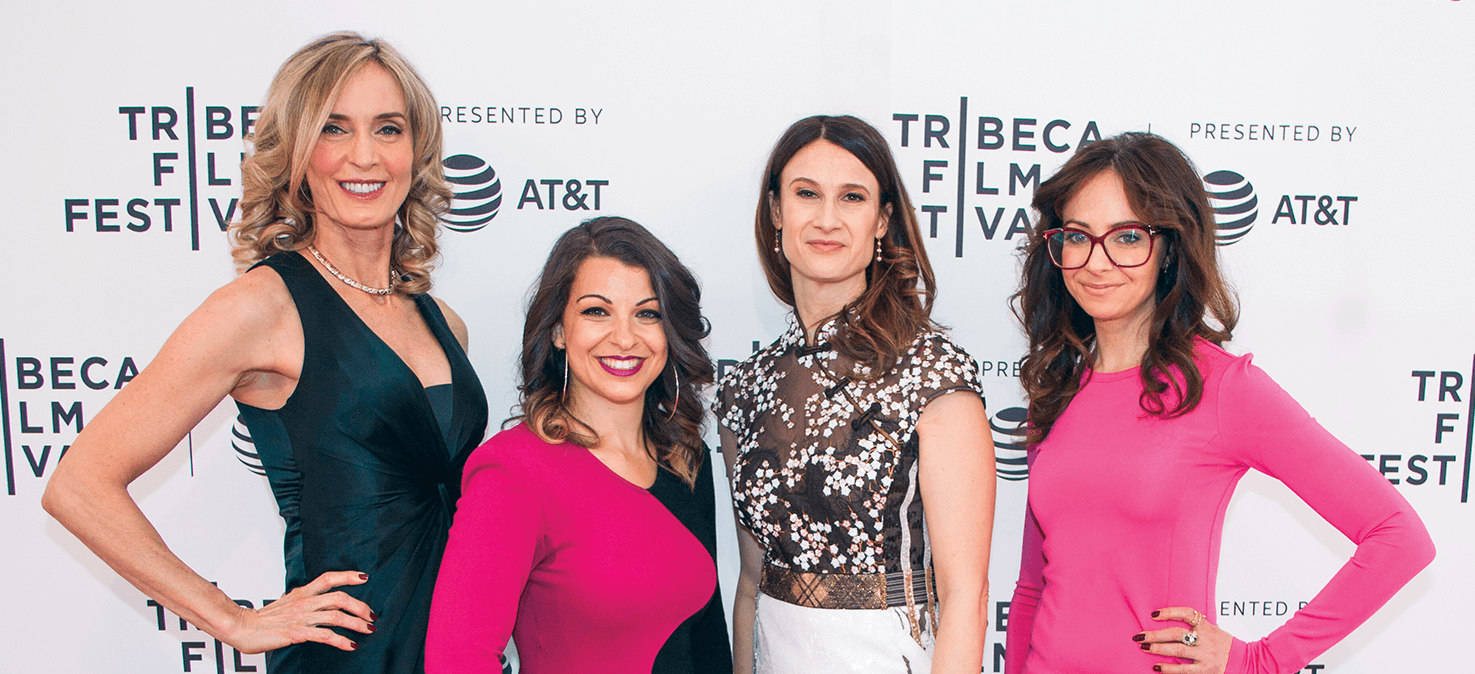 FROM LEFT: Tina Reine with Netizens costar Anita Sarkeesian, director Cynthia Lowen and costar Carrie Goldberg at the Tribeca Film Festival
FROM LEFT: Tina Reine with Netizens costar Anita Sarkeesian, director Cynthia Lowen and costar Carrie Goldberg at the Tribeca Film Festival
I grew up ashamed to speak. Some speech sounds I could not physically produce—even after many hours of speech therapy. Born with a cleft lip and palate, I couldn’t stop the airflow as I spoke, which meant all my sounds had a nasal quality. For practice, I was instructed to hold a mirror under my nose and not fog it up. This was difficult considering I didn’t have a palate to close off the airflow. The worst part was, when I spoke the kids would mock my speech and make it sound as though they were talking through their noses. It happened so often that I avoided speaking in public. My family and stuffed animals never made fun of me.
As an adult, speaking didn’t get any easier. I spent my career ducking out of meetings that would potentially require me to speak. My first job after getting my MBA was at an investment bank. I still remember the day I got called on to answer a question in front of my peers. Instead of answering using my voice, I wrote the answer on a piece of paper, pretending to have laryngitis.
Not speaking up for yourself can have devastating results. Five years ago, my life took an unexpected turn. I was the victim of severe online harassment from an ex-boyfriend-turned-stalker. It was so extreme that it shut down my career and my social life.
I became passionate about raising awareness around cyber harassment, its debilitating effects and how it leaves victims feeling powerless. After all the years of bullying and, later, cyberbullying, I finally decided to stand up for myself. I remembered my grandfather was a Toastmaster. He was a smart man, and if he found value in it, I would too. Plus, I figured my only hope to be able to speak up was either hypnosis or Toastmasters. Toastmasters sounded like a lot more fun.
In the midst of the cyber harassment and trying to solve it, I found a club with warm, friendly, fun members, but I was distracted with survival and didn’t go back. A year later, I felt stronger and returned to that same club. They remembered me and made me feel welcome, just as they had the first time. This time I stayed, and now they can never get rid of me.
The first role I took was that of timer. I remember when it was my turn to explain my role I stood up and could barely stop my knees from knocking together. Speech by speech, with the support of my club, I became more and more able to speak without feeling like I was going to faint.
When the cyber harassment started I reached out to a support organization, Cyber Civil Rights Initiative, and developed a relationship with them. A year later a documentary filmmaker, Cynthia Lowen, approached me about becoming part of a project on cyber harassment. It meant being interviewed on camera, eventually appearing on the big screen and speaking on interactive panels with live audiences of more than 500 people. Luckily, by this time I had been in Toastmasters for a year and had developed the courage to be one of the key subjects of this film. The documentary, Netizens, premiered at the Tribeca Film Festival in April 2018, and I was part of a Q&A panel after the airing. If it had not been for Toastmasters, I would have sidestepped this opportunity.
In addition to finding the courage to participate in the film, Toastmasters gave me the confidence to give a TEDx Talk about finding my passion (in my case, dancing) to get through the tough moments in life. I’m so grateful to Toastmasters for empowering me to find—and use—my voice to raise awareness of important issues that support others.
Tina Reine, ACS is a member of Freddy’s Forum and El Cid Toastmasters clubs in West Palm Beach, Florida. She has worked as an Environmental Commodities Trader for Cantor Fitzgerald in London, for JP Morgan in New York City and for NextEra Energy in Juno Beach, Florida. For fun, she performs as an aerial acrobat, something she tried for the first time in her 40s.



 Previous
Previous
 Previous Article
Previous Article